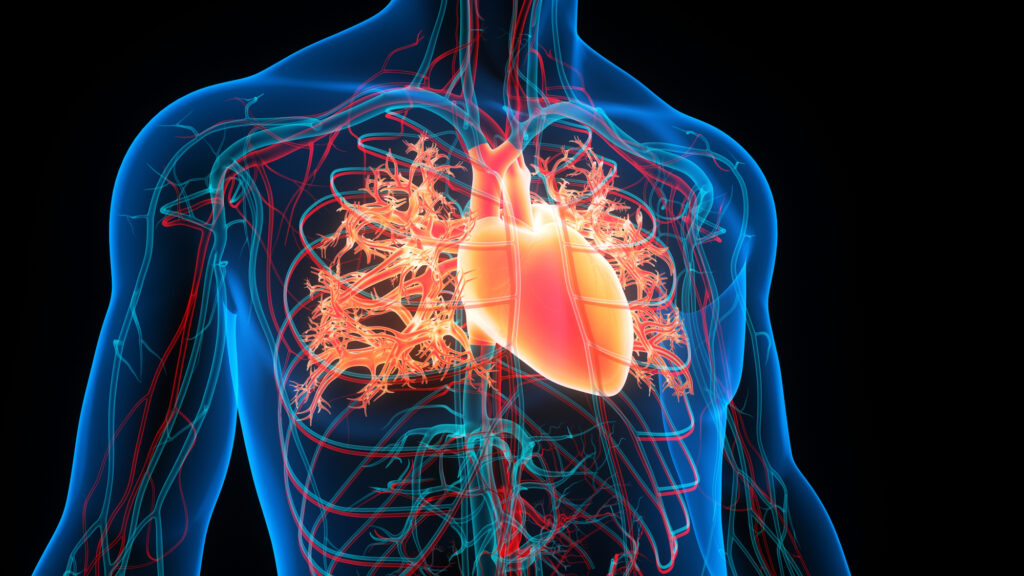Congestive Heart Failure (CHF) is a chronic progressive condition where the heart muscle is unable to pump blood efficiently enough to meet the body’s needs. As a result, vital organs do not receive adequate oxygen and nutrients, leading to a cascade of complications. CHF affects millions globally and is a leading cause of hospitalization in older adults.
Understanding the symptoms, recognizing the stages, and exploring modern treatment options can significantly improve quality of life and longevity for those living with this condition.
What Is Congestive Heart Failure?
Congestive Heart Failure doesn’t mean the heart has stopped working. Instead, it means the heart’s pumping power is weaker than normal, causing blood to move more slowly through the heart and body. This causes fluid to accumulate in the lungs, liver, legs, and abdomen—hence the term “congestive.”
Causes of CHF
CHF often develops due to other conditions that weaken or damage the heart. These include:
- Coronary artery disease (CAD)
- High blood pressure (hypertension)
- Heart attacks
- Diabetes
- Heart valve disease
- Cardiomyopathy (heart muscle disease)
Common Symptoms of Congestive Heart Failure
Symptoms of CHF vary depending on its stage and whether it affects the left, right, or both sides of the heart.
General Symptoms
- Shortness of breath (especially during exertion or lying down)
- Fatigue and weakness
- Swelling in the legs, ankles, and feet
- Rapid or irregular heartbeat
- Persistent cough or wheezing, sometimes with white or pink blood-tinged phlegm
- Increased need to urinate at night
- Weight gain due to fluid retention
- Difficulty concentrating or decreased alertness
Left-Sided Heart Failure
Left-sided CHF is more common and leads to fluid backing up in the lungs.
- Shortness of breath
- Coughing or wheezing
- Difficulty breathing while lying down (orthopnea)
Right-Sided Heart Failure
This occurs when the right ventricle fails to pump blood effectively, often due to left-sided CHF.
- Swelling in legs and ankles
- Abdominal swelling (ascites)
- Liver congestion
Stages of Congestive Heart Failure
CHF progresses through four stages, defined by the American College of Cardiology/American Heart Association (ACC/AHA):
Stage A – At Risk for Heart Failure
- No structural heart disease or symptoms
- Risk factors like hypertension, diabetes, metabolic syndrome
Goal: Prevent heart failure by managing lifestyle and risk factors
Stage B – Structural Heart Disease, No Symptoms
- Diagnosed with conditions like previous heart attack or valve disease
- No signs or symptoms of heart failure
Goal: Prevent progression and onset of symptoms
Stage C – Structural Heart Disease with Symptoms
- Noticeable symptoms such as fatigue, swelling, shortness of breath
- Daily activities may be affected
Goal: Improve quality of life and reduce hospitalizations
Stage D – Advanced Heart Failure
- Severe symptoms even at rest
- Frequent hospitalizations
Goal: Specialized treatments, palliative care, or heart transplant consideration
Diagnosis of CHF
To diagnose CHF, doctors use a combination of tests and assessments:
Physical Examination
- Listening for heart murmurs or lung congestion
- Checking for leg swelling or fluid in the abdomen
Diagnostic Tests
- Echocardiogram: Measures ejection fraction (heart’s pumping ability)
- Electrocardiogram (ECG): Detects heart rhythm issues
- Chest X-ray: Shows fluid in lungs or enlarged heart
- Blood tests: Check for kidney/liver function, BNP (B-type natriuretic peptide) levels
- Stress testing and cardiac MRI in some cases
Modern Treatment Approaches for CHF
Treating CHF involves a combination of lifestyle changes, medications, and sometimes devices or surgery. The treatment depends on the stage and cause of heart failure.
Lifestyle Modifications
- Low-sodium diet to reduce fluid buildup
- Regular physical activity to strengthen the heart
- Limiting alcohol and quitting smoking
- Monitoring weight daily to detect fluid retention early
Medications
Several medications are used to reduce symptoms, improve heart function, and prolong life:
- ACE inhibitors/ARBs: Lower blood pressure and reduce heart strain
- Beta-blockers: Improve heart function and reduce arrhythmias
- Diuretics: Help eliminate excess fluid
- Aldosterone antagonists: Improve symptoms and survival
- SGLT2 inhibitors: Newer diabetes drugs that also benefit heart failure
Advanced Therapies
- Implantable cardioverter-defibrillator (ICD): Prevents sudden cardiac death
- Cardiac resynchronization therapy (CRT): Coordinates heartbeats
- Left ventricular assist device (LVAD): Helps pump blood in advanced stages
- Heart transplant: Last resort for end-stage heart failure
Monitoring and Long-Term Management
Regular follow-ups with a cardiologist and heart failure team are essential. Patients are usually enrolled in heart failure management programs to track:
- Blood pressure
- Heart rate
- Kidney function
- Medication side effects
Educating patients on self-care—like recognizing early signs of fluid buildup—greatly improves outcomes.
Prognosis and Quality of Life
CHF is a chronic condition, but many patients live for years with proper treatment. The five-year survival rate depends on the stage at diagnosis, underlying causes, and adherence to treatment.
With timely intervention and lifestyle changes, many patients enjoy improved quality of life, reduced symptoms, and fewer hospitalizations.
Conclusion
Congestive Heart Failure is a complex condition that affects millions worldwide. Recognizing early symptoms, understanding the stages, and embracing modern treatment strategies can make a substantial difference in managing this disease.
With advances in medication, technology, and care strategies, patients can live longer, healthier lives. Empowerment through education, consistent care, and lifestyle adjustments are the pillars of heart failure management today.
FAQs
1. Can congestive heart failure be cured?
No, CHF is a chronic condition, but with proper treatment and lifestyle changes, it can be managed effectively.
2. What is the most common cause of CHF?
The most common cause is coronary artery disease, which restricts blood flow to the heart muscle.
3. How can I prevent heart failure?
Controlling blood pressure, managing diabetes, exercising regularly, eating a heart-healthy diet, and not smoking can all prevent or delay heart failure.
4. Is swelling always a sign of heart failure?
Not always, but swelling in the feet, ankles, or abdomen can be an early warning sign and should be evaluated by a doctor.
5. How often should someone with CHF see a doctor?
Patients with CHF should have regular check-ups, typically every 1–3 months, depending on severity and stability of their condition.





